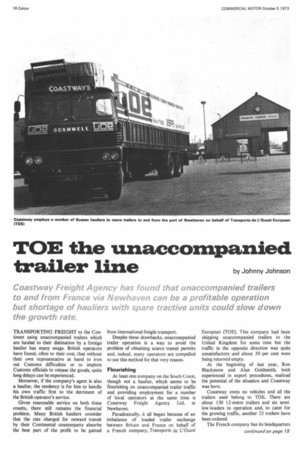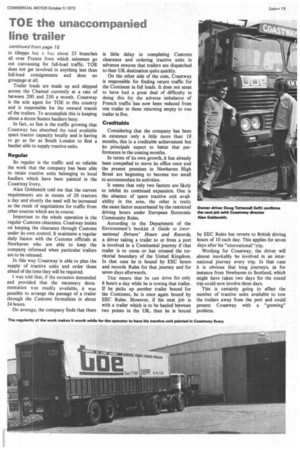TOE the 'unaccompanied
Page 82

Page 85

If you've noticed an error in this article please click here to report it so we can fix it.
trailer line by Johnny Johnson
Coastway Freight Agency has found that unaccompanied trailers to and from France via Newhaven can be a profitable operation but shortage of hauliers with spare tractive units could slow down the growth rate.
TRANSPORTING FREIGHT to the Continent using unaccompanied trailers which are hauled to their distination by a foreign haulier has many snags. British operators have found, often to their cost, that without their own representative at hand to iron out Customs difficulties or to implore Customs officials to release the goods, quite long delays can be experienced.
Moreover, if the company's agent is also a haulier, the tendency is for him to handle his own traffic first to the detriment of the British operator's service.
Given reasonable service on both these counts, there still remains the financial problem. Many British hauliers consider that the rate charged for onward transit by their Continental counterparts absorbs the best part of the profit to be gained from international freight transport.
Despite these drawbacks, unaccompanied trailer operation is a way to avoid the problem of obtaining scarce transit permits and, indeed, many operators are compelled to use this method for that very reason.
Flourishing
At least one company on the South Coast, though not a haulier, which seems to be flourishing on unaccompanied trailer traffic and providing employment for a number of local operators at the same time is Coastway Freight Agency Ltd, at Newhaven.
Paradoxically, it all began because of an imbalance of loaded trailer exchange between Britain and France on behalf of a French company, Transports de L'Ouest European (TOE). This company had been shipping unaccompanied trailers to the United Kingdom for some time but the traffic in the opposite direction was quite unsatisfactory and about 30 per cent were being returned empty.
At the beginning of last year, Ron Black more and Alan Goldsmith, both experienced in export procedures, realized the potential of the situation and Coastway was born.
Coastway owns no vehicles and all the trailers used belong to TOE. There are about 130 12-metre trailers and six semilow-loaders in operation and, to cater for the growing traffic, another 25 trailers have been ordered.
The French company has its headquarters
in Dieppe but it has about 23 branches all over France from which salesmen go out canvassing for full-load traffic. TOE does not get involved in anything less than full-load consignments and does no groupage at all.
Trailer loads are made up and shipped across the Channel currently at a rate of between 200 and 250 a month. Coastway is the sole agent for TOE in this country and is responsible for the onward transit of the trailers. To accomplish this is keeping about a dozen Sussex hauliers busy.
In fact, so fast is the traffic growing that Coastway has absorbed the total available spare tractor capacity locally and is having to go as far as South London to find a haulier able to supply tractive units.
Regular So regular is the traffic and so reliable the work that the company has been able to retain tractive units belonging to local hauliers which have been painted in the Coastway livery.
Alan Goldsmith told me that the current requirements are in excess of 20 tractors a day and shortly the need will be increased as the result of negotiations for traffic from other sources which are in course.
Important to the whole operation is the regular Customs clearance. Coastway insists on keeping the clearance through Customs under its own control. It maintains a regular daily liaison with the Customs officials at Newhaven who are able to keep the company informed when particular trailers are to be released.
In this way Coastway is able to plan the supply of tractive units and order these ahead of the time they will be required.
I was told that, if the occasion demanded and provided that the necessary documentation was readily available, it was possible to arrange the passage of a trailer through the Customs formalities in about 24 hours.
On average, the company finds that there is little delay in completing Customs clearance and ordering tractive units in advance ensures that trailers are dispatched to their UK destination quite quickly.
On the other side of the coin. Coastway is responsible for finding return traffic for the Continent in full loads. It does not seem to have had a great deal of difficulty in doing this for the adverse imbalance of French traffic has now been reduced from one trailer in three returning empty to one trailer in five.
Creditable Considering that the company has been in existence only a little more than 18 months, this is a creditable achievement but its principals expect to better that performance in the coming months.
In terms of its own growth, it has already been compelled to move its office once and the present premises in Newhaven High Street are beginning to become too small to accommodate its activities.
It seems that only two factors are likely to inhibit its continued expansion. One is the absence of spare tractive unit availability in the area, the other is really the same factor exacerbated by the restricted driving hours under European Economic Community Rules.
According to the Department of the Environment's booklet A Guide to International Drivers' Hours and Records, a driver taking a trailer to or from a port is involved in a Continental journey if that trailer is to cross or has crossed the territorial boundary of the United Kingdom. In that case he is bound by EEC hours and records Rules for that journey and for seven days afterwards.
This means that he can drive for only 8 hours a day while he is towing that trailer. If he picks up another trailer bound for the Continent, he is once again bound by EEC Rules. However, if his next job is with a trailer which is to be hauled between two points in the UK, then he is bound
by EEC Rules but reverts to British driving hours of 10 each day. This applies for seven days after his "international" trip.
Working for Coastway, the driver will almost inevitably be involved in an international journey every trip. In that case it is obvious that long journeys, as for instance from Newhaven to Scotland, which might have taken two days for the round trip could now involve three days.
This is certainly going to affect the number of tractive units available to tow the trailers away from the port and could present Coastway with a "growing" problem.
















































































































































